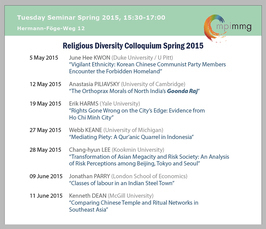"The Mobilization of the Social and the Dearth of Social Imaginaries: Local Appropriations of “Building Society” (shehui jianshe) in Shenzhen’s Urban Periphery"
Religious Diversity Colloquium Spring 2015
- Datum: 16.06.2015
- Uhrzeit: 15:30 - 17:00
- Vortragende: Mun-young Cho (Yonsei University, South Korea)
- Mun Young Cho is an associate professor of the Department of Cultural Anthropology at Yonsei University, South Korea. Her research focuses on poverty, labor, development, and youth in China and South Korea. Based on fieldwork in Harbin, her first book The Specter of “The People”: Urban Poverty in Northeast China (Cornell University Press, 2013) examines how a state dedicated to serving “the people” manages the impoverishment of urban workers, the one-time representatives of the socialist project. Currently, Cho is conducting research on the evolving landscapes of grassroots activism in South Korea as well as on migrant youth in a Shenzhen’s Foxconn town in southern China, along with various modes and actions of mobilizing “the social.”
- Ort: MPI-MMG, Hermann-Föge-Weg 12, Göttingen
- Raum: Conference Room

For more details please contact vdvoffice(at)mmg.mpg.de.
How can we understand the coexistence between increasing concerns about the crisis of social imaginaries (about social justice, communal care, and solidarity) and increasing activities exercised in the name of the social? This paper responds to this question by tracing local appropriations of recent state projects of “building society” (shehui jianshe), which represent the state-led mobilization of the social in contemporary China. Ethnographic fieldwork in Shenzhen’s Foxconn town in the urban periphery demonstrates how “the social” is imbued with different meanings and uses among differently conditioned players—local state agents, village elites, and young migrant workers. Although the visibility of social interventions leads us to rethink Eurocentric discussions of “the death of the social,” the fragmented and makeshift appropriations of social sectors bring to light some limitations of state-centered initiatives, which subordinate social construction to a pursuit of economic progress but rarely address market-driven inequalities.